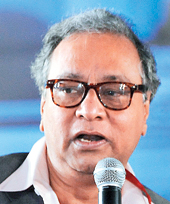Indian academics and bureaucrats locked horns with students from across the globe at a lively panel discussion on “Is History an Academic Antique?” at Victoria Memorial, as part of Calcutta’s Festival of the Spoken Word 2015 presented by the Calcutta Debating Circle and The Telegraph with Century Ply as the principal sponsor. “The topic for tonight is particularly fascinating for all of those who are deeply interested and invested in history as well as all of those who think history is bunk,” said Jayanta Sengupta, secretary and curator, Victoria Memorial Hall. A cloudy December sky and a few spells of drizzle did nothing to dampen the spirit of the panel moderated by Pradeep Gooptu and Raju Raman. Some highlights from the discussion:

Jawhar Sircar, CEO, Prasar Bharati:
The question is not whether history is an antique or a modern piece. The issue is whether it is still useful. Does it still gel? Of course it does. It gels for those who have a genuine sense of knowing their patrimony, for those who have a sense of belonging. It’s (also) useful for those who pervert the discipline for their own political agenda; it’s used by crackpots, most vigorously, to pervert and to bring in an imagined sense of deprivation, an imagined sense of elevation, achievement and then masquerade these prejudices as urbanised academics.

Pavan Varma, bureaucrat & author:
When does history become an antique? When you showcase history but don’t learn from it, it becomes an antique, a trophy. When you’re so obsessed with the present that you believe history is of no relevance to how you mould that present or how you plan the future, it becomes an antique. When instead of being a reference point and an avenue of inference, it becomes a subjective tool for distortion. The great danger of history becoming an antique is not that it actually becomes an antique, that it is reduced to an antique in order to serve the purposes of certain subjective and often distorted narrative.

Samita Sen, professor at Jadavpur University:
Is history an antique because it is academic or is history an antique within the academic? Both these questions could be treated as quite different but they could also be seen as connected…. The fact remains that everything has a history. Even History with a capital H has a history with a small h. And we can see today how the small h powerfully inflects the capital H. History then, I would say is anything but antique, if you mean by that antiquated and obsolete. In the end what is wrong with antiques? Aren’t they valuable things? The problem though may be, that sometimes antiques are so valuable that they’re invaluable. Which is another way of saying they’re valueless.

Sudipta Sen, professor at University of California, Davis:
I looked up the word antique in the entomological dictionary, it means something of the past, it could mean something which is not modern, not current, it could also mean something that is obsolete. In the later years, it becomes a word for precious, something valuable. History is a faceted, venerable and much maligned and debated way of approaching the world. I think the pejorative (in the topic) lies in the adjective ‘academic’. I don’t think that the notion of history being subjective necessarily means history being distorted. The objectivity and subjectivity are philosophical questions and cannot be easily dispelled. And history is ultimately an exercise of said philosophy.

Rudrangshu Mukherjee, vice chancellor, Ashoka University:
The word history refers to the past so whatever happens in the past is history. A second meaning of the word history, where the controversy starts, is writing about the past. This is where the “inert past” gets life. History, however paradoxical it sounds, has life. It is lively because it debates all the time. Debate is embedded in history, we cannot escape it…. I don’t mind history being an antique, even an invaluable antique. What I mind is that antiques can be auctioned to the highest bidder. Neither history nor historians are up for auction, at least they shouldn’t be.
TWO QUESTIONS FROM TWO PARTS OF THE WORLD
Swarochish Goswami, University of Toronto
Q: History has many interpretations. How can teachers teach one version of history to the students?
Sudipta Sen: History cannot be a singular narrative about what happened in the past. History is also about facts that we cannot say with certainty or we should not say with certainty. Those conflicts and differences actually make up history.
Safee Ul Haque, Institute of Business Administration, Karachi
Q: India and Pakistan share the same history but there are different interpretations of Partition. And the shared history is so fragile that no one dares to touch it, fearing that it might hurt their 60-year-old beliefs. How can this be solved in an ideal manner?
Jawhar Sircar: I empathise with the question and completely relate to it. Injustice is being done to our history and we are not able to do much to save it. We are not empowered to offer a solution but history needs to be protected.
Rudrangshu Mukherjee: There might be animosity between the two countries but there is no animosity between the people of the two countries and your presence here today proves the fact.
Reporting by Deborima Ganguly and Rumela Sinha; pictures by Pabitra Das










